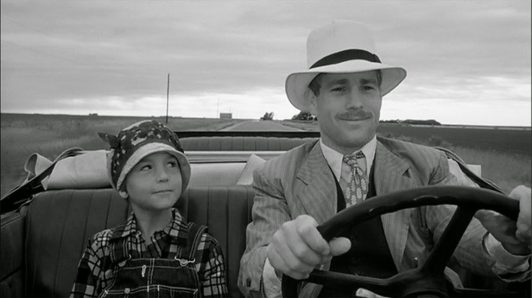Get to “I Love You” – Part 2

We said in last week’s post that an extremely useful principle of storytelling is “Get to ‘I love you’.” Meaning structure the novel or movie so that two clashing opposite or unlikely people move from indifference to each other (or outright hostility) to that great moment when they can look in each other’s eyes and say, “I love you.”
But it’s even better if the line that means “I love you” says the exact opposite. In other words, the text says one thing but the subtext says another. And the subtext wins.

In Peter Bogdanovich’s Paper Moon (from the novel “Addie Pray” by Joe David Brown), nine-year-old Addie Loggins (played by Tatum O’Neal ) is an orphan in Depression-era Kansas who goes on the road with flim-flam man Moses Pray (played by Ryan O’Neal, her real-life father). Addie’s wish through the whole story is to prove that Moses is her father in the movie—and to stay with him.
In the final sequence of the picture, Moses drops Addie off with her true aunt in Saint Joseph, Missouri, deciding that his flim-flam ways and life on the road are not healthy for a young girl. But Addie immediately bolts from the nice-but-very-dull aunt and chases Moses on foot down a country road. She catches him where he has stopped, feeling unsure about his decision. When Moses sees Addie running toward him, he gets out of his broken-down Model-T truck and confronts her.
MOSES
I told you I don’t want you ridin’ with me no more.
Addie is heartbroken. Then, suddenly, Moses’ truck’s brakes fail … the old clunker starts rolling away down a hill.
ADDIE
Mose! Look!
Moses groans, grabs the few belongings that Addie is carrying (her radio and pint-size suitcase) and dashes to catch the runaway truck. Addie follows. He leaps on board from one side, she springs up from the other. As the truck wheezes away down a road soaring to the horizon, the song “Keep Your Sunny Side Up” plays on the soundtrack.
In other words, “I love you.”




Thanks for these posts, Steve. The posts either make me feel that my work isn’t so bad and on the right track, or it needs more work and can be made better. Either way, it’s a win.
I remember seeing Paper Moon years ago. The ending was very satisfying, but I could not have explained why. Now I know. Thanks!
Thank you very much dear Steve.
It made me remember the other sides of the coin too, all those times in real life when the “text” was harsh but also equal to the “subtext”. Or the times when the text was positive but the subtext was negative. But in real life it gets so complicated, so rather let me stay at the works of art.
Two opposing forces, connected, create drama then. Yes following No, Declined but Accepted. The times when No becomes Yes may bring the only sensation of salvation. Even Yes that is followed with Yes seems to lack that sensation, to be a little dull, like Addie’s aunt. Resistance is hiding there too, I’m certain. And maybe another kind of salvation is created when we reach the bottom and feel it and accept it. Like the army that when surrounded must be let to believe that there is some exit, so as not to charge themselves with the mysterious power of hopelesness, which seems to equal the “I am here and now, ONLY” mentality.
I haven’t consciously used that in the book. Yet I may assume that my internal clashing symbols create some of that work, for I am nothing but a clashing of symbols. Should I use it at the ending? That’s a beautiful question.
That hope in the Moses’ eyes when saying No, so fragile! We are not (only) grown men, we are children who need our mothers to hold us tight in their arms while being weak and totally helpless and totally quiters.
Thanks, Steve. We seem to sometimes live in contractions that merge. For awhile.
Thank you for another lesson, Master.
👏👏🙌
DITTO !!
Well, I’m defiantly watching that movie again.
🍃🌸🍃
EXACTLY what I was thinking!!! (how cute is Tatum O’Neal!!)
I know! She was darling.
It’s all those missed opportunities. The times we wish we could redo. I think we relate to the times we should have said, I love you, come back, but didn’t. Seeing a happy ending, finally expressing what we thought we couldn’t before, is redeemed. Those are scenes I watch over and over.
🍃🌸🍃
Brilliant. Thank you.
Steve, the soundtrack was missing at the end. I was looking forward to hearing Keep Your Sunny Side Up. That should be my theme song, my way to overcome the present challenge to untangle a single story from the mass of raw material that churns around nonstop in my mind like twisted clothing in a high speed washing machine.
I’m thinking of my life; looking for the subtext of “I love you” under harsh words (or societal circumstances). I wonder what that will yield? And what about when I meet up with Resistance?
Thank you steven, for your contribution. It was so helpful and really admire your thoughts. I wish we can read more stories like that.
Love this take on storytelling it’s always more powerful when “I love you” is shown through subtext rather than stated outright. Those moments where the emotion breaks through despite the words are what really stick with you. Great insight!